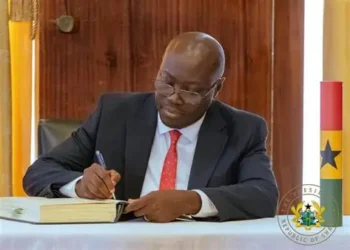The government appears to show ‘little interest’ in revising the royalties/tax regime in the mining industry, despite numerous calls by stakeholders, and experts towards this end.
Unlike the oil and gas industry which is undergoing a period of severe turbulence and to a large extent, ‘demonized’ at worse, the mining industry has seen much less of disturbances in the industry.
Albeit, within the context of the ongoing energy transition, the sector faces some level of risks. By deciding strategic portfolio of mining assets to invest in, investors are channeling their investments, where existing fiscal regimes are favorable.
Without assessing the energy transition risks for the mining sector— making critical policy changes to reflect the changing dynamics in the sector— the long expected benefits to be achieved in the coming years will merely be archived in the annals of history, at best.

In addition, the sector’s pride in gold production— its largest foreign exchange earner— and which it currently is the largest producer on the continent may be lost.
Based on 2020 statistics, Ghana lost its position as the second-largest recipient of investments in gold exploration on the continent to Burkina Faso. Cote d’Ivoire took first place and Mali took the third place and Ghana, fourth.
While the mineral’s fiscal regime has not changed much, sector players, especially the Chamber of Mines has over the years, decried the ‘overly repressive nature of the tax regime’, as it tends to dwindle investments into exploration and development of mining sites.
Ghana’s State Gold Mining Company struggling
To make matters worse, the government’s sole gold mining company, the Prestea Sankofa Gold Limited (PSGL) has turned a ‘fiasco’, remaining dormant for the past five years.
Compared to peers in the region, governments are increasing budgetary allocations for gold exploration. And according to the Chamber of Mines, this explains why Cote d’Ivoire, took the lead for investment in gold exploration last year.
With reference to the above, the Chief Executive Officer of the Chamber of Mines, Mr Sulemanu Koney is on record to have advocated for the creation of an enabling environment for exploration investments.
“…provide a fertile and conducive exploration companies to use practically 100 per cent of their exploration investment into exploration, rather than paying taxes and other levies even before they break ground.
“…and our expectation is that in the not too distant future, policy makers will hear our cry…” and enact policies allowing exploration companies to operate competitively in the country.

The Vaultz Magazine in its article, ‘Ghana’s Obsession with Mineral Rents: What happened to value addition all these years?’ stressed the repulsive nature of the taxes hurled at multinational mining corporations, without considerations for aggressively adding value to its mineral resources.
“It is almost a cliché that has been told by governments and sector ministers over and again that: value addition, however simple and compelling, is but challenging to practice.
“…the potential dividends to be accrued through… value addition are evident, and to delay this further is to lengthen the current phenomenon of the paradox of owning abundant of mineral resources, yet poverty-ridden.”
The Vaultz Magazine
Increasing production shares in mining contracts
Mirroring the call for reforms in the fiscal regime, some experts in the industry have called for this revision to be fashioned in such a manner that the government increases its production sharing rights in contracts. This is towards maximizing the revenues accrued to the government from the sector.
Their call coincide with that of the IMF’s Fiscal Affairs Department in its 2012 ‘Fiscal Regimes for Extractive Industries: Design and Implementation’:
“…in mining, governments commonly retain one-third or rather more; simulations suggest higher government shares (40–60 percent), but do not capture all possible sources of revenue erosion. Fiscal regimes that raise less than these benchmark averages may be cause for concern, or— where agreements cannot reasonably be changed— regret.”
IMF
Whether the government should go this direction or merely consider reducing taxes within the existing fiscal regime will have to be situated in the context of the ongoing energy transition risks and the finite nature of the resource.
The government must show commitment to looking into these concerns to steer the right course for the country’s mining sector. This is not the time for the government to become comfortable and leave things to chance.
READ ALSO: There’s limited knowledge on RTI law- Kwaku Asante























